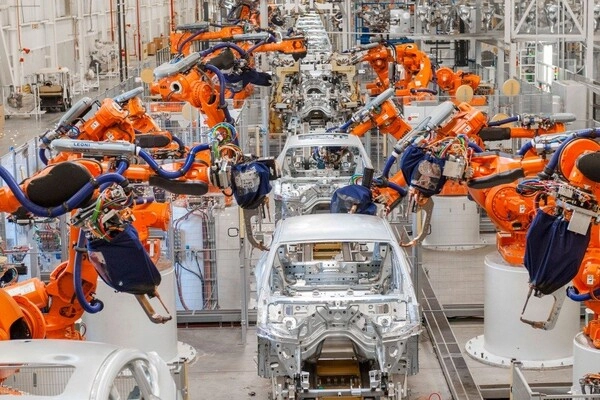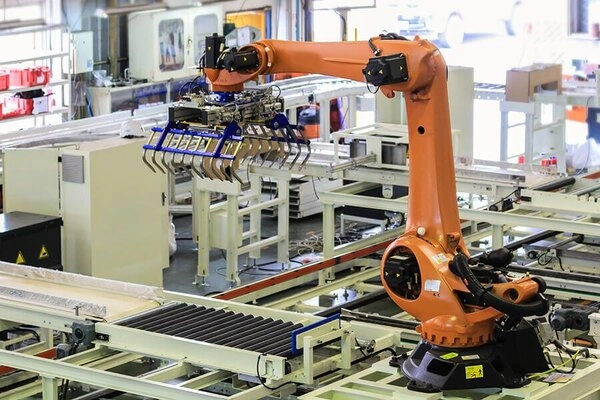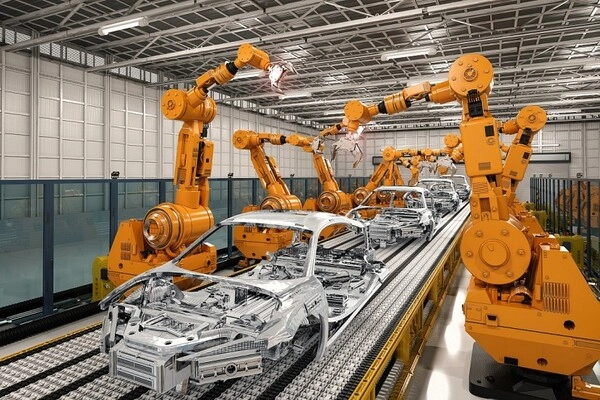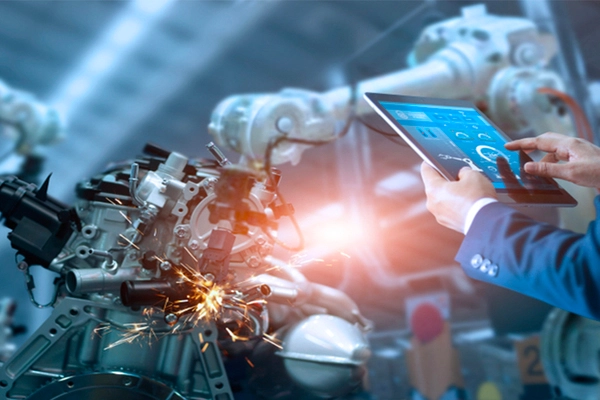IoT industrial automation offers smart solutions for modern manufacturing by connecting machines and systems, monitoring processes, and collecting real-time data. This enables businesses to improve efficiency, reduce operational costs, enhance product quality, and optimize safety and accuracy in industrial environments.
What is IoT industrial automation?
IoT industrial automation is the integration of Internet of Things (IoT) technology with automation systems in manufacturing environments. Instead of relying entirely on humans to operate, monitor, and control equipment and machinery, IoT allows everything to be connected, data to be transmitted, and decisions to be made automatically based on real-time information analysis. As a result, factories and businesses can operate more efficiently, lower costs, and increase productivity.

This concept not only includes remote monitoring and data collection but also extends to predictive maintenance, automated servicing, and optimization of the entire production process. As a result, IoT industrial automation has become a crucial foundation in the Industry 4.0 revolution.
The Role of IoT in Industrial Automation
IoT plays a central role in connecting devices, machinery, and systems within factories. Through sensors, controllers, and management software, IoT collects data from equipment and transmits it to a central monitoring hub. This enables managers to analyze information and make fast, accurate, and effective decisions.
Moreover, IoT supports remote monitoring, reduces reliance on direct human labor, and enhances flexibility in production. Thanks to this role, IoT industrial automation not only optimizes productivity but also minimizes risks, ensures safety, and improves product quality.
Advantages and Disadvantages of IoT Industrial Automation
While IoT industrial automation offers numerous outstanding benefits, it also comes with certain limitations. Understanding these advantages and disadvantages helps businesses apply the technology intelligently, balancing cost, efficiency, and potential risks.

Advantages of IoT Automation in Manufacturing
- Increased productivity and operational efficiency: IoT automation systems help reduce machine downtime, optimize production processes, and improve resource utilization.
- Remote monitoring and management: IoT sensors allow managers to track equipment status and production progress anytime, anywhere, via smartphones or computers.
- Predictive maintenance and issue prevention: Data collected from IoT enables AI to anticipate potential problems and perform maintenance before serious failures occur.
- Reduced operational costs: By minimizing reliance on manual labor and optimizing energy usage, businesses can significantly lower operational expenses.
- Improved product quality: Automated systems provide continuous quality control, reducing errors and defects during production.
Disadvantages and Limitations of IoT Automation
- High initial investment: Implementing IoT in manufacturing requires substantial investment in devices, sensors, management software, and network infrastructure.
- High technical skill requirements: Businesses need skilled engineers and staff to operate and maintain the system effectively.
- Security risks: IoT data transmitted over the Internet can be vulnerable to attacks if not properly secured.
- System integration challenges: Existing legacy systems may be difficult and time-consuming to integrate with IoT.
- Dependence on stable network infrastructure: If the Internet or cloud systems fail, the entire automated process can be disrupted.
Practical Applications of IoT Industrial Automation
Today, IoT industrial automation is widely applied across various manufacturing sectors:

- Automotive Industry: Monitoring assembly lines, detecting defects early, and optimizing component production processes.
- Electronics Industry: Tracking product quality in real-time and adjusting machinery to reduce defect rates.
- Food and Beverage Industry: Managing temperature, humidity, and packaging processes to ensure hygiene and safety.
- Energy Sector: Monitoring and controlling energy consumption to optimize operational costs.
- Smart Warehouses: Automatically managing inventory, coordinating robots, and controlling goods transportation.
Thanks to these applications, businesses not only save costs but also enhance their competitiveness in the market.
Challenges and Future Trends of IoT Industrial Automation

Although IoT industrial automation offers numerous benefits, it still faces several challenges:
- Data security and safety: The risk of cyberattacks is increasing, requiring advanced security solutions.
- Data standardization and system integration: For IoT to function effectively, data from various devices must be standardized.
- Maintenance and upgrade costs: IoT systems require regular maintenance and upgrades to maintain optimal performance.
In the future, development trends will focus on:
- AI and Machine Learning integration with IoT: Enabling demand prediction, process optimization, and automated production adjustments.
- Cloud systems and big data: Storing and analyzing large volumes of data to enhance intelligent decision-making.
- Comprehensive automation and robotics: IoT robots will take over more tasks, reducing reliance on manual labor.
- Enhanced IoT security: Developing encryption, monitoring, and cybersecurity risk management solutions.
Thanks to these trends, IoT industrial automation will become increasingly widespread, helping manufacturing businesses become smarter, more flexible, and more competitive.
IoT industrial automation is reshaping the future of smart manufacturing. With its capabilities for connectivity, monitoring, and process optimization, businesses can not only improve efficiency and product quality but also reduce costs and risks. The adoption of IoT in industrial automation will continue to be a key factor in making factories more agile, efficient, and competitive in the Industry 4.0 era.
